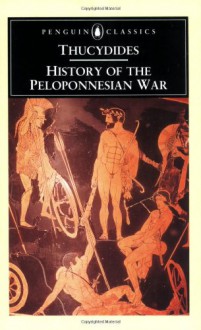
Two political-economic systems compete for influence and dominance after the greatest war that has ever happened, but peace could not last. The History of the Peloponnesian War by Thucydides covers the first twenty years of the war between Athens and Sparta before it’s abrupt ending, but throughout his text the motives of the participants and the analysis of unintended consequences shows give the war it’s full context.
The first book—created by later editors not Thucydides—of the work focuses on early Greek history, political commentary, and seeks to explain how the war was caused and why it happened when it did. Over the course of Books 2 through 8, Thucydides covered not only the military action of the war but also the numerous political machinations that both sides encouraged in each other’s allied cities or in neutrals to bring them to their side. The war is presented in a chronological manner for nearly the entire work with only two or three diversions in either historical context or to record what happened elsewhere during the Sicilian Expedition that took up Books 6 & 7. The sudden ending of the text reveals that Thucydides was working hard on the work right up until he died, years after the conflict had ended.
The military narrative is top notch throughout the book which is not a surprise given Thucydides’ time as an Athenian general before his exile. Even though he was an Athenian, Thucydides was positively and negatively critical of both Athens and Sparta especially when it came to demagogues in Athenian democracy and severe conservatism that permeated Spartan society in all its facets. Though Thucydides’ created the prebattle and political speeches he relates, is straightforwardness about why he did it does not take away from the work. If there is one negative for the work is that Thucydides is somewhat dry which can make you not feel the urge to pick up the book if you’ve been forced to set it down even though you’ve been enjoying the flow of history it describes.
The History of the Peloponnesian War though unfinished due to Thucydides death was both a continuation of the historic genre that Herodotus began but also a pioneering work as it recorded history as it happened while also using sources that Thucydides was able to interview. If you enjoy reading history and haven’t read this classic in military history, then you need to.

 Log in with Facebook
Log in with Facebook 


 BABT
BABT






